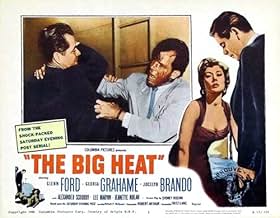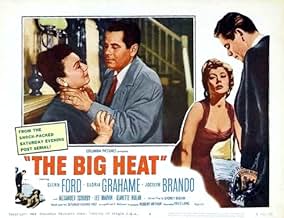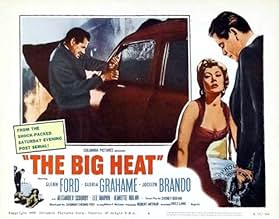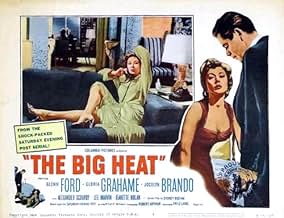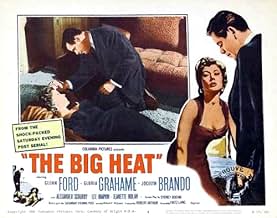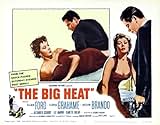IMDb-BEWERTUNG
7,9/10
31.349
IHRE BEWERTUNG
Der harte Polizist Dave Bannion nimmt es mit einem politisch mächtigen Verbrechersyndikat auf.Der harte Polizist Dave Bannion nimmt es mit einem politisch mächtigen Verbrechersyndikat auf.Der harte Polizist Dave Bannion nimmt es mit einem politisch mächtigen Verbrechersyndikat auf.
- Regie
- Drehbuch
- Hauptbesetzung
- Auszeichnungen
- 2 Gewinne & 2 Nominierungen insgesamt
Empfohlene Bewertungen
Fritz Lang can conjure up a paranoid thriller with the greatest of ease (actually, it's probably a lot of work, but it looks easy, which is a feat unto itself), and The Big Heat provides some of his classic paranoia to the proceedings of a story of a good, hard cop on the trail of a case that's gone way too corrupt. There are simple visual touches, amid what looks like a standard-shot thriller (when compared to, say, M, which is Godly in its vision of the darkness of humanity's layers peeled back). But it's got the kind of grit to it that most likely inspired Dirty Harry, even if, arguably, Glenn Ford isn't quite as great a star as Clint Eastwood. He's got a style to himself, anyway, like someone who is almost TOO good, and knows it, which is why he'll get the job done even if it means some busted knuckles and a few cracked heads. He's a compelling force as Dave Bannion, and he's perfectly cast against a bunch of sinister, slimy characters (save for the women, and even one of them is just rotten).
After a cop seems to have killed himself, the case looks open and shut. But there seems to be more for Bannion, as he didn't seem like a guy, from some accounts, to do himself in. Turns out there's a big cheese named Lagana who wants this put hush-hush like, and pays off the widow to keep a letter he wrote under wraps. But Bannion is suddenly put to the test, if only of himself, when his family is put in danger (with, of course, tragic results). Lang doesn't stop for a detail that isn't worthy of the attention of the narrative, and there's a connection that he makes between the world of the criminal underworld and the law: it's a place where there's some gray, but the black and white aspect rings through due to the situation at hand: corrupt cops, dirty criminals, and only a couple of dames to trust in the mix of it (one of them Debby, played in another great turn by Gloria Grahame, takes a savage incident with a pot of coffee via Lee Marvin's hand to wise up).
It might not have the depth of an M or Scarlett Street, but the Big Heat is about as solid a genre piece as one could ask for, getting more harrowing from the first gun shot of the picture all the way to the final moment when Bannion leaves the office for a hit-and-run case (a cop's work is never finished, one might suggest). It's also got more intelligence for its conventional roots with the little things; for example, there's a point in the movie where something pivotal could've happened with Bannion's daughter and the thugs, but Lang makes a good step to push aside it, keeping the focus squarely on the task at hand instead of sidestepping the climax into cliché. Land understands how, for the sake of a piece of pulp fiction like this, to keep the lines in order, even if it might seem standard for today: keep Bannion's family wholesome, maybe TOO wholesome, with stories of three little kittens, and keep the criminal elements savage, sinister in their grins and suits and violence brimming underneath.
One things for sure, it doesn't get much less thrilling than seeing Ford and Marvin in an unpredictable shoot-out. A+
After a cop seems to have killed himself, the case looks open and shut. But there seems to be more for Bannion, as he didn't seem like a guy, from some accounts, to do himself in. Turns out there's a big cheese named Lagana who wants this put hush-hush like, and pays off the widow to keep a letter he wrote under wraps. But Bannion is suddenly put to the test, if only of himself, when his family is put in danger (with, of course, tragic results). Lang doesn't stop for a detail that isn't worthy of the attention of the narrative, and there's a connection that he makes between the world of the criminal underworld and the law: it's a place where there's some gray, but the black and white aspect rings through due to the situation at hand: corrupt cops, dirty criminals, and only a couple of dames to trust in the mix of it (one of them Debby, played in another great turn by Gloria Grahame, takes a savage incident with a pot of coffee via Lee Marvin's hand to wise up).
It might not have the depth of an M or Scarlett Street, but the Big Heat is about as solid a genre piece as one could ask for, getting more harrowing from the first gun shot of the picture all the way to the final moment when Bannion leaves the office for a hit-and-run case (a cop's work is never finished, one might suggest). It's also got more intelligence for its conventional roots with the little things; for example, there's a point in the movie where something pivotal could've happened with Bannion's daughter and the thugs, but Lang makes a good step to push aside it, keeping the focus squarely on the task at hand instead of sidestepping the climax into cliché. Land understands how, for the sake of a piece of pulp fiction like this, to keep the lines in order, even if it might seem standard for today: keep Bannion's family wholesome, maybe TOO wholesome, with stories of three little kittens, and keep the criminal elements savage, sinister in their grins and suits and violence brimming underneath.
One things for sure, it doesn't get much less thrilling than seeing Ford and Marvin in an unpredictable shoot-out. A+
An honest, family man cop with a wife and daughter is put onto the investigation of another cop's suicide. He closes the case as suicide due to ill health. However when a women tells him another story and is promptly killed, Bannion just investigates further to find that powerful criminals and powerful politicians share the same table at dinner. When his family is split in an attack meant for him he loses his job and becomes bitter he starts to become more like his enemies as he pursues them.
This is a hardboiled thriller that would still stand up today as a tough film violence and attitudes that make it feel more modern than it is. The story follows the descent of family man Bannion into violence and bitterness when he not only loses what is important to him, but when he finds that corruption at high levels has fed down into rank and file officers causing him to stand out when he tries to catch a criminal.
The brutality of this film shouldn't be underestimated Fritz Lang is no softy! Here we have women beaten and killed, we have sex crimes, we have a women disfigured by scalding coffee in her face. Of course all these things are unseen but this was the 50's! However it is still powerful and adds to the intensity of the film. The story may well have been done many times now but imagine seeing something like this back then!
The cast are great. Ford descends into bitterness really well and seems at ease as both thug and family man. The female cast are good in different ways but the one that catches the eye is a young Lee Marvin. I suspect Marvin got fame because his coffee attack stuck in people's minds even today he is best know as a tough guy in the movies.
Overall this is well worth hunting out it is still being copied by many video thrillers and it just goes to show that you don't have to show gory or graphic violence on screen to be powerful, gritty or shocking.
This is a hardboiled thriller that would still stand up today as a tough film violence and attitudes that make it feel more modern than it is. The story follows the descent of family man Bannion into violence and bitterness when he not only loses what is important to him, but when he finds that corruption at high levels has fed down into rank and file officers causing him to stand out when he tries to catch a criminal.
The brutality of this film shouldn't be underestimated Fritz Lang is no softy! Here we have women beaten and killed, we have sex crimes, we have a women disfigured by scalding coffee in her face. Of course all these things are unseen but this was the 50's! However it is still powerful and adds to the intensity of the film. The story may well have been done many times now but imagine seeing something like this back then!
The cast are great. Ford descends into bitterness really well and seems at ease as both thug and family man. The female cast are good in different ways but the one that catches the eye is a young Lee Marvin. I suspect Marvin got fame because his coffee attack stuck in people's minds even today he is best know as a tough guy in the movies.
Overall this is well worth hunting out it is still being copied by many video thrillers and it just goes to show that you don't have to show gory or graphic violence on screen to be powerful, gritty or shocking.
It's doubtful that even Dirty Harry in his most menacing moments could match the smouldering rage that Glenn Ford brings to the screen in this excellent 1953 Fritz Lang flick. From a modern POV there is nothing unfamiliar here, except maybe the dated hardboiled lingo. The maverick cop, the revenge theme, the underworld characters and heroines. It's just that whereas a modern director would make this into a predictable two hour yawn-fest with slow-motion car accidents and ten minute shootouts with shoulder-launched missiles, Lang's movie clocks in at under 90 minutes, and there isn't an ounce of fat on it. It's lean, fast-moving and engrossing. Not a single camera shot is wasted or unnecessary. The script crackles, the cast is uniformly excellent, and Ford and Lee Marvin in particular are unforgettably intense. Ford, just when he's about to go way over the top, reins himself in, adding to the aura of barely suppressed violence in his character.
The movie can also lurch from plot exposition to sudden, economical and unexpected explosions of violence which can still shock today and must have been extremely confronting fifty years ago. And from there it can become suddenly, unexpectedly sensitive and moving.
Nothing is wasted in this movie. Everything is nailed down just right. It's not that they don't make them like this any more; it's more that they've been making them like this ever since, and generally to lesser and lesser effect.
A strong 8 out of 10.
The movie can also lurch from plot exposition to sudden, economical and unexpected explosions of violence which can still shock today and must have been extremely confronting fifty years ago. And from there it can become suddenly, unexpectedly sensitive and moving.
Nothing is wasted in this movie. Everything is nailed down just right. It's not that they don't make them like this any more; it's more that they've been making them like this ever since, and generally to lesser and lesser effect.
A strong 8 out of 10.
Effective film noir about a cop fighting the mob as well as his own corrupt superiors as he investigates a murder. Ford has perhaps the best role of his career as the good cop. His scenes with wife Brando are very nicely handled, adding poignancy to the tragedy that would befall the family. There are shades of Dirty Harry as Ford takes matters into his own hands. Marvin and Grahame are also good as a mobster and his moll, respectively. Lang, a master of this sort of film-making, keeps things moving at a snappy pace. Some of the violence is jarring but of course nothing graphic is shown, given the era the movie was made in. After an excellent start, the second half of the film becomes somewhat routine but it still packs a punch.
Normally, when I think of Film Noir, I DON'T think about Glenn Ford. Yes, he did a few, but his personality always seemed a little too "nice" to play in these gritty films. I was very pleasantly surprised then, when I saw this movie. Ford is an honest cop in a very crooked town. However, when the mob attacks and nearly kills him (killing his wife instead), he "pops a fuse" and becomes a very tough cop who won't take NO for an answer. I loved watching him slap people around and threaten his way to the top of the syndicate, as, with his life in ruins, he had nothing to lose.
Along the way, the headstrong Ford encounters a lot of amazing characters--all played exceptionally well. In particular, a young Lee Marvin gives perhaps his best supporting performances as a hood who has a penchant for beating up women. In one scene, he nearly breaks a bit actress' arm (and it happens to be Carolyn Jones in a performance before she was famous). In another scene, he throws scalding hot coffee in the face of his girlfriend, Gloria Grahame. It was so brutal and realistic, I flinched and found my stomach churning at its ferocity and cruelness. As for Miss Grahame, she plays the sort of excellent role she became known for--a "dame" who, down under layers and layers of scum, beats a real human heart.
Wonderful performances, terrific pacing and excellent writing make this one film well worth seeing and as a result, it's one of the best examples of Film Noir out there and a great example of a film about a cop who's seen enough and is on a rampage. This is probably Glenn Ford's best performance.
FYI--In what appears to be a cool inside joke, in one of the scenes where Ford is in the bar, the song "Mame" is playing in the background--the same song made so memorable by Rita Hayworth in GILDA--a Glenn Ford film from 1946.
Also FYI--I recently saw this film for the second time. I rarely watch films twice, but this one impressed me so much the first time, I couldn't resist. The film was, believe it or not, better the second time around and I noticed so many wonderful Film Noir touches that I truly love this movie.
Along the way, the headstrong Ford encounters a lot of amazing characters--all played exceptionally well. In particular, a young Lee Marvin gives perhaps his best supporting performances as a hood who has a penchant for beating up women. In one scene, he nearly breaks a bit actress' arm (and it happens to be Carolyn Jones in a performance before she was famous). In another scene, he throws scalding hot coffee in the face of his girlfriend, Gloria Grahame. It was so brutal and realistic, I flinched and found my stomach churning at its ferocity and cruelness. As for Miss Grahame, she plays the sort of excellent role she became known for--a "dame" who, down under layers and layers of scum, beats a real human heart.
Wonderful performances, terrific pacing and excellent writing make this one film well worth seeing and as a result, it's one of the best examples of Film Noir out there and a great example of a film about a cop who's seen enough and is on a rampage. This is probably Glenn Ford's best performance.
FYI--In what appears to be a cool inside joke, in one of the scenes where Ford is in the bar, the song "Mame" is playing in the background--the same song made so memorable by Rita Hayworth in GILDA--a Glenn Ford film from 1946.
Also FYI--I recently saw this film for the second time. I rarely watch films twice, but this one impressed me so much the first time, I couldn't resist. The film was, believe it or not, better the second time around and I noticed so many wonderful Film Noir touches that I truly love this movie.
Wusstest du schon
- WissenswertesColumbia wanted to borrow Marilyn Monroe from 20th Century-Fox to play the role of Debby Marsh, but Fox's asking price was too high. Gloria Grahame was cast instead.
- PatzerThe street address for the junkyard on Bannion's list is "101", yet the number "1024" is seen on a large sign over the yard's shed.
- Zitate
Debby Marsh: [to Bannion] Oh, well, you're about as romantic as a pair of handcuffs.
- VerbindungenFeatured in Hexenkessel (1973)
- SoundtracksIt's a Blue World
(uncredited)
Written by Chet Forrest and Bob Wright
Heard instrumentally during one of the scenes at The Retreat
Top-Auswahl
Melde dich zum Bewerten an und greife auf die Watchlist für personalisierte Empfehlungen zu.
Details
Box Office
- Weltweiter Bruttoertrag
- 7.083 $
- Laufzeit1 Stunde 29 Minuten
- Farbe
- Seitenverhältnis
- 1.37 : 1
Zu dieser Seite beitragen
Bearbeitung vorschlagen oder fehlenden Inhalt hinzufügen


